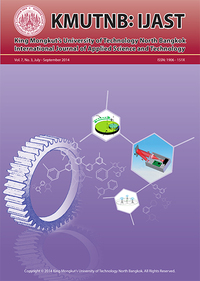Novel Halotolerant Cellulolytic Bacillus methylotrophicus RYC01101 Isolated from Ruminant Feces in Thailand and its Application for Bioethanol Production
Main Article Content
Abstract
One impediment of large-scale biofuel production from lignocellulosic biomass is the insufficiency of cellulolytic microorganisms that can overcome extreme conditions during the industrial process. This study emphasized the isolation of a novel efficient cellulolytic bacterium. A new Bacillus methylotrophicus RYC01101, isolated from ruminant feces in Thailand, produced a hydrolysis capacity greater than that of known cellulolytic bacteria (Cellulomonas sp.). Cellulase activities were investigated on CMCase activity and FPase activity by 0.230±0.004 and 0.080±0.007 U/mL, respectively. B. methylotrophicus RYC01101 was co-cultured with Saccharomyces cerevisiae TISTR 5111 for bioethanol production. The productivity of the bioethanol was 1.38±0.40 g/L after 120 hours of fermentation. Moreover, B. methylotrophicus RYC01101 could be grown in the presence of 10% (w/v) NaCl, which could be applied in the pretreatment step of biofuel production. This study was the first report on cellulolytic activity and the halotolerant ability of B. methylotrophicus.
Article Details
How to Cite
Chantarasiri, A. (2014). Novel Halotolerant Cellulolytic Bacillus methylotrophicus RYC01101 Isolated from Ruminant Feces in Thailand and its Application for Bioethanol Production. Applied Science and Engineering Progress, 7(3), 63–68. retrieved from https://ph02.tci-thaijo.org/index.php/ijast/article/view/67449
Issue
Section
Research Articles


